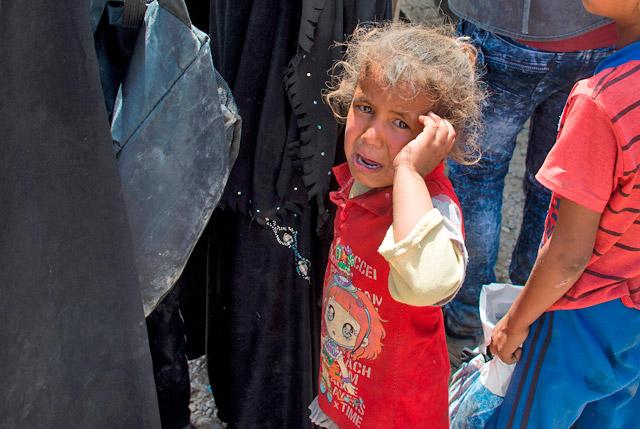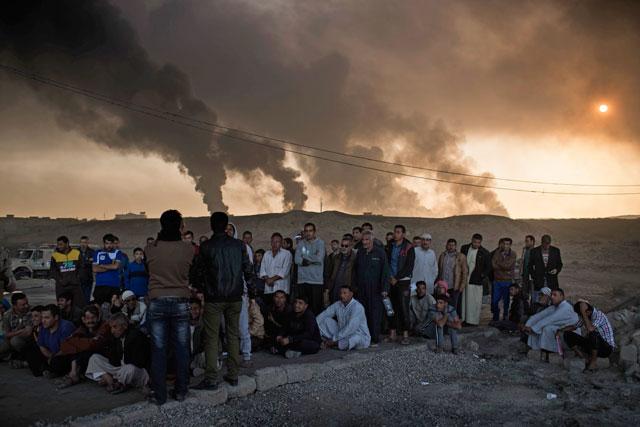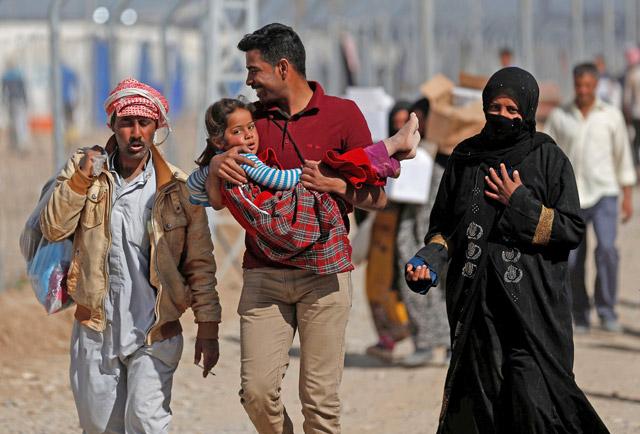You are here
Rescued 'human shields' tell of Mosul horror
By AFP - May 15,2017 - Last updated at May 15,2017

An Iraqi child cries at a camp for internationally display people in Hammam Al Alil on Sunday, after fleeing west Mosul due to the government forces ongoing offensive against the Daesh militants (AFP photo)
HAMMAM AL ALIL, Iraq, — Fear and hunger are driving an ever-growing number of Iraqi civilians into a camp in Hammam Al Alil, where they share harrowing tales of deadly violence and extremist tyranny in Mosul.
Some arrive at the displacement camp, the largest in the Mosul area, on foot, but most of them are crammed into buses and trucks, relieved and exhausted.
Half a million people are currently displaced as a result of the massive seven-month-old offensive to retake Iraq's second city from the Daesh terror group.
Thursday saw what the Norwegian Refugee Council said was the biggest single-day displacement since the start of the operation, with around 20,000 fleeing neighbourhoods of west Mosul.
"I feel safe, I did not think I would get out of there alive," said Shams Hassan, a woman in her forties who reached the Hammam Al Alil camp on Friday with 16 members of her family.
She is from the Al Faruq neighbourhood of Mosul's Old City and lost track of the number of times she and her relatives had to change houses and neighbourhoods in recent months.
"They always wanted us to be in front of them to use us as human shields. They would come to tell us to change houses," she said.
"We would find ourselves in the middle of shelling and car bombs. One of the houses we lived in was struck by a mortar round, it collapsed on us and I was wounded by shrapnel. I had to be carried," she said.
A large population remains in Mosul's Old City, where Daesh appears to have concentrated most of it remaining resources. Some estimates put the number of civilians still trapped in west Mosul at 250,000.
Human shields have become a central feature of the vastly outnumbered jihadists' defence and Daesh has stopped at nothing to deter people from escaping the city.
"Those who tried to flee were executed in the streets and their bodies hung from posts," Shams Hassan said.
Her mother, who reached Hammam Al Alil a few weeks earlier, sat next to her, her gaze lost in the distance.
"Daesh would take our food," the old lady said."They would come with their guns and take our clothes too."
Trapped residents reached by AFP inside the areas still controlled by Daesh have warned recently that hunger was beginning to kill more people than the intense fighting itself.
There is no clean water left to drink and even unclean water is hard to come by. People are boiling paper and cartons to fill their stomachs.
"A bottle of oil was 50,000 dinars [around 40 US dollars], a can of tomatoes was 50,000 dinars too. Flour was 5,000 dinars. We ate some of it and got sick," said Shams Hassan.
At age 72, Ahmed Yunis Dawood dodged sniper fire to leave west Mosul through the neighbourhood's water mains.
"For five days, I would go out at night to check out the streets," he recounted.
In the Hammam Al Alil camp he reached early Sunday, the elderly man found safety but little else.
“The people who arrive here have no tent, no bed to sleep in, no food, no water,” Dawood said.
Aid groups have been delivering assistance in the camps to tens of thousands of civilians daily but the lack of funding, the recent peak in displacement and soaring temperatures are leaving many outside the relief net.
Related Articles
HAMMAM AL ALIL, Iraq — Hammam Al Alil's sulphur springs and reopened spa have become a spot where the soldiers fighting in Mosul and the civ
NEAR HAMMAM AL ALIL, Iraq — Iraqi troops advancing towards Mosul battled on Saturday for the last town left between them and Daesh stronghol
HAMMAM AL ALIL CAMP — The Iraqi intelligence officer kept barking the same question at the 46-year-old man who was looking nervously at his













